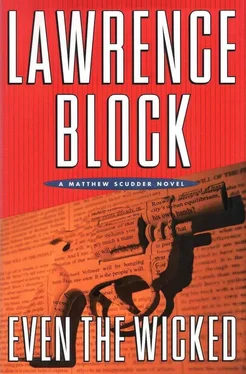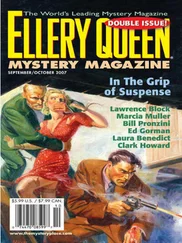“I suppose it was,” he said, as if that aspect hadn’t occurred to him before. “It was awful for her. I used to pray that she would die. I felt conflicted about that. How can you pray for the death of someone you love? You can pray for relief, but can you pray for death? ‘God, ease her pain,’ I would say. ‘God, give her the strength to bear her burden.’ And then I would find myself praying, ‘God, let it be over.’” He sighed, straightened up. “Not that it made the slightest bit of difference. The disease had its own schedule, its own pace. Prayer wouldn’t slow it down or speed it up. It tortured her for as long as it wanted to, and then it killed her. And then it was over.”
The tape recorder had a sense of theater. It picked that moment to get to the end of side one. You want to open it up and turn the cassette over and start it recording again with as little fuss as possible, to keep from breaking the mood. So of course my fingers sabotaged the process, fumbling with the catch, fumbling with the cassette.
Maybe it was just as well. Maybe the mood needed breaking.
When he resumed talking, he returned to the subject of Byron Leopold. “At first I just thought that someone might kill him,” he said. “Some burglar breaking into his house, some mugger on the street. Anything, a stray bullet from a war between drug dealers, anything I’d read about in the newspaper or see on television. I’d recast it in my mind and imagine it happening to him. There was a program, I think it was based on a real case, this male nurse was smothering patients. They weren’t all terminal, either, so I don’t suppose it was strictly a case of mercy killing. I thought that might happen, and I realized if it did the death would probably be misdiagnosed and recorded as natural.”
“And you’d be cheated.”
“Yes, and never know it. For all I knew some thoughtful nurse had smothered Harlan Phillips on his deathbed. There was a double-indemnity clause in that policy, too. So for all I knew—”
“Yes.”
“If Byron Leopold was going to be murdered, it couldn’t look as though he’d died in his sleep, or succumbed to his disease. It wouldn’t have to be disguised as an accident. I checked, and homicide fits the definition of accident for insurance purposes. By now, you see, I was contemplating doing it myself. I don’t know when that happened, that the idea entered my mind, but once it was there it was always there. I couldn’t think of anything else.”
He had never thought of taking an active part in ending his wife’s agony. Even when he prayed for her death, it never occurred to him to do anything to bring it about. When he had reached the point that he was actively considering ways to kill Byron Leopold, it struck him that a knife or a bullet would have spared his wife a great deal of suffering.
“But I could never have done it,” he said.
“But you thought you could do it with Leopold.”
“I didn’t know. The only way I could imagine doing it was with a gun. I couldn’t possibly strike him or stab him, but maybe I could point a gun and pull a trigger. Or maybe not. I wasn’t at all certain.”
“Where did you get the gun?”
“I’d had it for years. It belonged to an uncle of mine, and when he passed away my aunt didn’t want it in the house. I put it in a trunk in the attic, along with a box of shells that came with it, and never thought of it again. And then I did think of it, and it was where I’d put it. I didn’t even know if it would work. I thought it might blow up in my hand if I tried to fire it.”
“But you used it anyway?”
“I drove out into the country and test-fired it. I just shot a couple of bullets into a tree trunk. It seemed to work all right. So I went home, and I thought about it, and I couldn’t eat and I couldn’t sleep and I knew I had to do something. So I went to New York.”
“How did you get the gun through airport security?”
“How did I... But I didn’t go to the airport. I didn’t fly, I never fly.”
“You told me that,” I said. “I’d forgotten.”
“I took the train,” he said. “There’s no security check, no metal detectors to pass through. I guess they’re not afraid of hijackers.”
“Not since Jesse James.”
“I went to New York,” he said, “and I found the building where he lived, and it turned out there was a bed-and-breakfast just a block and a half away. I didn’t know how long I’d be there but I didn’t think it could possibly take me more than a week. Assuming I would be able to do it.”
As it turned out, he could have done it the morning after his first night in the bed-and-breakfast. He’d gone to the little park so that he could watch the entrance to Leopold’s building, and the minute he saw the man emerge on crutches and carrying a newspaper, he somehow knew it was the man he sought. AIDS showed in the man’s face, and it was evident that the disease was in its later stages.
But he hadn’t brought the gun with him. It was in his room, wrapped in a dish towel and locked in his suitcase.
He brought it the following morning, and Byron Leopold was already on his bench in the park when he got there. It had occurred to him that there might be more than one AIDS victim living at that address, given that the neighborhood seemed to have a high concentration of homosexuals. While a quick death would undoubtedly constitute a blessed deliverance for this man, whoever he might be, it seemed prudent to make sure of his identity. This was, to be sure, murder for gain, however he chose to rationalize it, and it would profit him not at all to kill the wrong person.
“So I went up to him,” he said, “and I called him by name, and he nodded, and I said his name again, and he said yes, that he was Byron Leopold, or whatever he said, I don’t remember exactly. And I still wasn’t sure I would do it, you see, because I hadn’t committed myself. I could just walk away having made the identification, and then I could do it some other time. Or I could go back home and forget about it.
“‘Mr. Leopold?’ ‘Yes.’ ‘Byron Leopold?’ ‘Yes, what is it?’ Something like that. And then I had the gun out and I was shooting him.”
He was vague on the details after that point. He started running, expecting pursuit, expecting capture. But no one came after him and no one caught him. By early evening he was back on the train, bound for Cleveland.
“I thought they would come for me,” he said.
“But no one did.”
“No. There were people in the park. Witnesses. I thought they’d furnish a description and one of those composite drawings would be in all the newspapers. I thought someone would make a connection between the insurance policy and myself. But there was nothing in the papers, nothing at all as far as I could see. And I kept waiting for someone to come to the door, but no one did.”
“It sounds as though you would have welcomed it.”
He nodded slowly. “I’ve thought about it all the time,” he said, “and I still can’t explain it, not to myself and certainly not to anybody else. I had the illusion that I could go to New York and kill this man, and then I could come back here, and the only change in my life would be that I would have more money.”
“But that’s not the way it was.”
“The instant I pulled the trigger,” he said, “the illusion vanished like a portrait in smoke blown away by a gust of wind. You couldn’t even see where it had been. And it was done, the man was dead, there was no reversing it.”
“There never is.”
“No, there never is, not one bit of the past. It’s all etched in stone. You can’t erase a word, not a syllable.” He sighed heavily. “I thought... well, never mind what I thought.”
Читать дальше












